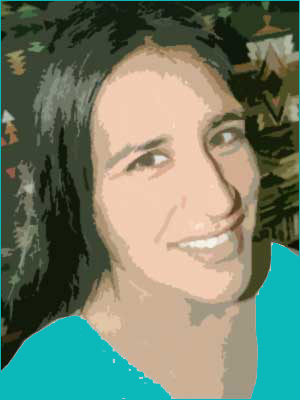|
Nanobah
Becker
|
||
| The
City continues to attract the curious, the adventurous, the creative,
the amazing. In spite of a pretty tough calendar year since last Fall,
young and inspired Native people join these ranks, seeking fame, fortune
or perhaps, a place to formulate and express another point of view. One
such person is Nanobah Becker, a film maker from the Dine Nation in New
Mexico, currently pursuing an MFA at Columbia University. She identifies
herself as Dine and a descendent of the Red House; still in her 20's,
she's had a varied life, filled with images and impressions. She holds
a BA in Anthropology from Brown University, another distinguished university.
Her desire to be near a big Northeastern city brought her to Brown - Rhode
Island is close to both Boston and New York, and she had a keen desire
to see what living in the Northeast would offer. Hearing this, one would
think that she was pursuing a straight through education, but this is
not so. Before coming to Columbia, she worked at AmeriCore in NM, which
is located on the Dine Nation, and spent almost three years at the Southwest
Indian Polytechnic Institute.
The
Columbia MFA program is a five year program, two years of course work,
with the remainder of the time to complete a thesis. Her curiosity is tempered by a careful observation on how the City could influence work she wants to create. Having just finished a short film, she cites living and working here is "hard, doing Native stuff", simply because the sheer diversity of the City does not always allow Native people to be readily visible or available. She does note the different pace of life, and is aware of the fear of becoming one of "them", the jaded New Yorker one can so readily see on the subway or in line somewhere. Aware of this, she is concerned about the dense human concentration, and she feels that this can make work harder for one's achievements. This motivating force, she believes, is good for her. In a few years, she imagines she'll have a better perspective on the world around her and the creation of her art. Noting the fluidity of her expression, inquiries about her education revealed much about her life experience- how to go from anthropology to film making? Initially, she went to school for archeology, and an epiphany occurred during a dig: one dig could take forever, and no answers would be forthcoming. Moving to anthropology, the idea of a double major seemed to be a fantasy. She held on to the dream of being a film maker, realizing that she had to try, or film making may never happen. Fluidity marks this conversation, and I am struck at how three things- the relationship to home in NM, formal studies in both archeology and anthropology, and the never-ending opportunities to study humanity - are summed up in a personal focus and a vision for work she aspires to create. Of professionals in the current film world, she admires Jane Campion's work (The Piano), Paul T. Anderson, the technical aspects of John Thomas Woo's work, David Lean and Jim Jarmusch. In creating her own voice in the film world, one feels she will offer a clarity of vision faithful to her own individual sense of being Navajo and other Navajo people. Discussing the complexities of modern Native life and pluralism brings about other's concerns about the need to be validated in the Native experience and a deeper sense of being, belonging and growth in Native communal life. Immediate goals are to create a good short film, submit a work to the Sundance Film Festival, write and direct films, and the pursuit of how to make images into effective communicative narratives. Asked about a legacy of future work, she offers: "I'm a Navajo film maker; I want to make films for a Navajo audience. I am just one voice, I don't speak for the entire experience, it would be great to have dozens and dozens of Navajo film makers. Since people live so differently, creation of a Navajo film is a unique experience. I am fascinated to see this vision. Since there are already other communities represented in cinema, it would be so great to see a Navajo native cinema, like the French cinema. It is important to have voices here, since we (Native people) live in this society". Well spoken, focused and honest to her personal vision, I am eagerly anticipating the fulfillment of her dream and the foundation of an exciting future cultural institution. Nanobah Becker's recent short film will be shown this Fall; see www.amerinda.org for updates and information. Tim Hays is a pianist & essayist; he will play a recital of Bach & Mozart in Kansas City in November.
|
||
|
|
